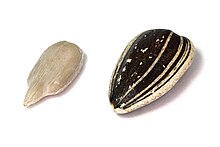
Back حب الشمس Arabic Насенне сланечніка Byelorussian Слънчогледови семки Bulgarian Llavor de gira-sol Catalan Маьлхан хӀуш CE Хĕвелчамăш CV Semilla de girasol Spanish Ekilore hazi Basque تخمه آفتابگردان Persian Auringonkukansiemen Finnish


A sunflower seed is a seed from a sunflower (Helianthus annuus). There are three types of commonly used sunflower seeds: linoleic (most common), high oleic, and sunflower oil seeds. Each variety has its own unique levels of monounsaturated, saturated, and polyunsaturated fats. The information in this article refers mainly to the linoleic variety.
For commercial purposes, sunflower seeds are usually classified by the pattern on their husks. If the husk is solid black, the seeds are called black oil sunflower seeds. The crops may be referred to as oilseed sunflower crops. These seeds are usually pressed to extract their oil. Striped sunflower seeds are primarily eaten as a snack food; as a result, they may be called confectionery sunflower seeds.
The term "sunflower seed" is actually a misnomer when applied to the seed in its pericarp (hull). Botanically speaking, it is a cypsela.[1] When dehulled, the edible remainder is called the sunflower kernel or heart.
- ^ Marzinek, Juliana; De-Paula, Orlando Cavalari; Oliveira, Denise Maria Trombert (September 2008). "Cypsela or achene? Refining terminology by considering anatomical and historical factors". Revista Brasileira de Botânica. 31 (3): 549–553. doi:10.1590/S0100-84042008000300018. hdl:11449/28034. ISSN 0100-8404.